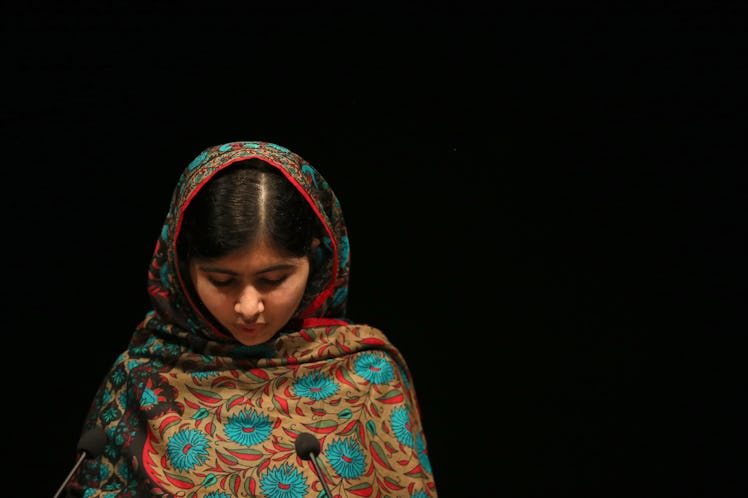
Malala Yousafzai Returned To Pakistan & The Response Was Heartwarming
The guiding principle of the Malala Fund, an organization that fights for girls' education, is: "If one girl with an education can change the world, what can 130 million do?" Now, the world's youngest Nobel laureate, who founded the organization, has finally returned to her birthplace, more than five years since she survived an assassination attempt by the Taliban. Malala Yousafzai returned to Pakistan March 29, and the response was heartwarming.
“Today, after 5 and a half years, I have set foot on my soil. Whenever I would travel, in plane or in car, I would imagine that it’s Pakistan and I am driving in Islamabad," Yousafzai, 20, said at her welcoming reception, fighting back tears, according to The Washington Post. "I would imagine this is Karachi, and it was never true, but now that I see it, I am very happy."
In 2007, Taliban militants took control of the Swat region, in Mingora, Pakistan, where Yousafzai grew up, according to her website. In December 2008, the Taliban issued an edict that banned girls from going to school, which was the inciting incident for Yousafzai's activism.
To the Taliban's chagrin, Yousafzai began writing for the BBC using the pen name “Gul Makai” to protect her identity, detailing what life was like under Taliban rule, per her website. The extremist group eventually retreated from Swat, and girls were able to return to school — but Yousafzai kept speaking up. In 2012, the Taliban retaliated against Yousafzai. A masked gunman boarded Yousafzai's school bus and asked for her by name, before shooting her in the head, neck, and shoulder. Two of Yousafzai's friends were also injured in the attack.
Nine months after being shot by the Taliban, Yousafzai gave a speech at the United Nations, which put Yousafzai on the world stage as an activist to be reckoned with. It was her 16th birthday, and she said,
The extremists were, and they are, afraid of books and pens. The power of education frightens them. They are afraid of women ... Let us pick up our books and pens. They are our most powerful weapons.
With her welcoming reception to Pakistan Thursday, she added another moving speech to her repertoire. The reception reportedly included senior government dignitaries, social activists, lawmakers, and community members from the Swat region, per the Post.
Yousafzai began to cry, and the audience broke into a roaring applause. As news of her arrival in Pakistan began to circulate Thursday morning (details of the trip were reportedly kept quiet for security reasons), people began voicing their support for Yousafzai's contributions to the world.
Yousafzai tweeted in August 2017 that she was accepted to Oxford University, where she planned to study philosophy, politics, and economics. In an interview with Teen Vogue published March 9, Yousafzai also said she admired the efforts of the Parkland shooting survivors, who have began organizing for gun control reform in the U.S. She even offered them some advice in fighting for their cause, as she has fought for hers, saying,
I am so happy that people are realizing that their voice can actually change the world. And people keep saying that their voice can't change the world and you don't get it clearly until you actually reach the point where you realize that if I speak about these issues, if I raise my voice, I will see impact. These young people will see an impact now because they have seen an issue, they have seen an injustice, and now they're speaking out. Their voices can be heard and I will say to them, 'Believe in yourself, believe in your voice and your voices won't get wasted.' So just continue in this fight and you may not hear your voice right away, but it will have an impact in the end.
She also has had her fair share of ordinary-teenager moments, which arguably contributes to her appeal. In the 2015 documentary He Named Me Malala, directed by Davis Guggenheim (An Inconvenient Truth, Waiting for 'Superman'), she jokes about thinking Swiss tennis champion Roger Federer is cute, teases her brothers for being lazy, and displays a sharp sense of humor. That sense of humor has been on display before, too. She's sat down with several late-night TV hosts over the years and displayed her many other talents — including the time she performed hilariously card tricks on The Late Show with Stephen Colbert.
Most recently, she sat down with David Letterman for his new Netflix show, My Next Guest Needs No Introduction, during which she discussed her first term at Oxford, recommitting herself to advocacy after nearly losing her life, and whether she prefers tacos or pizza.
"I realized that maybe this life is for a purpose, and I decided that I'll give this life to girls' education and speak out for them," she told Letterman.
Welcome home, Malala. Keep fighting the good fight.